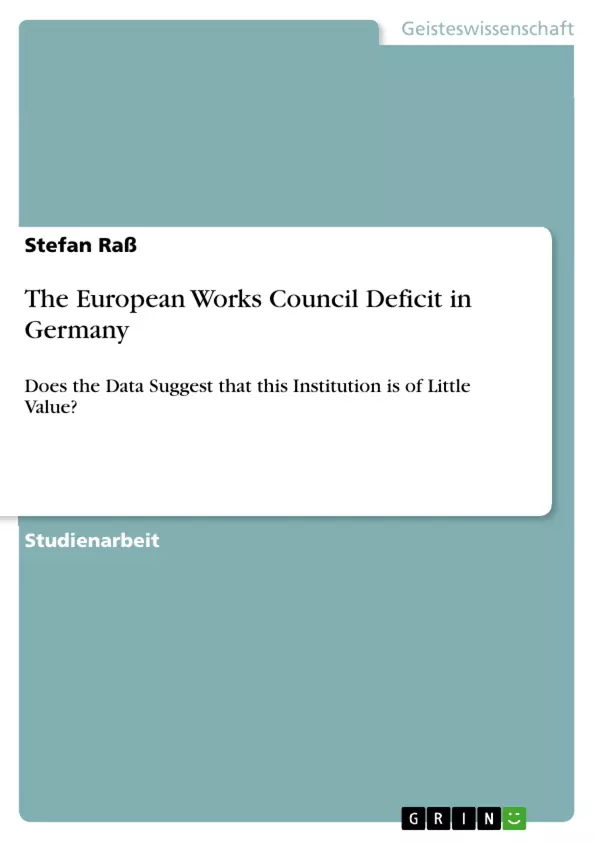Globalization is the driving force which propels human kind into an ever faster, more complex and interwoven economic system. In 1994 the European Works Councils Directive (EWCD) was passed by the Council of the European Union and 2016 marks the 20 years anniversary since the Directive came into force in 1996. The adoption of the Directive was marked by widespread debate and critics argued that the EWCD was a flawed means to generate transnational employee participation, while proponents saw great potential for an institution that fosters social dialog. The legislation was also controversial among policy makers. The European Commission envisioned a significant step forward for the development of the social dimension of industrial relations in Europe, while employer organizations opposed the EWCD and lobbied conscientiously to reduce the coverage of the Directive.
For the last 20 years there has been controversy around the effectiveness of the policy and the modest adoption of the Directive. This paper seeks to spread light on whether there is enough value in European Works Councils for the institution to prosper. Therefore the underlying issues concerning the low number of European employee representation are explored. Surprisingly, Germany is one of the countries with the lowest EWC coverage rate among its European partners.
Consequently, Europe’s biggest economy can serve as reverence point for problems with European Works Councils and is of special interest investigating the institution. This analysis shall serve as a steppingstone in order to figure out whether European Works Councils are of little value for workers, or whether the institution is still in the process of reaching its full potential.
Inhaltsverzeichnis
- Introduction
- European Works Councils
- The EWC Deficit in Germany – a Case for the Lack of Value of EWC?
- Where is the Deficit?
- Knowledge and Transparency
- Expected Value and Limited Resources
- The Maze of Capitalism and National Thinking
- Is there Value in a European Worker Representation?
- Enough Value to Prosper?
- Room to Improve
Zielsetzung und Themenschwerpunkte
Diese Arbeit untersucht das Defizit an Europäischen Betriebsräten (EBR) in Deutschland, um zu verstehen, warum die größte Volkswirtschaft Europas, ein Land, das als führend in den industriellen Beziehungen gilt, die Gesetzgebung der EU nicht in dem Maße annimmt wie viele andere europäische Nationen. Die Analyse konzentriert sich darauf, ob EBR einen ausreichenden Wert für Arbeitnehmervertreter bieten, um als florierende Institution zu bestehen, und untersucht die zugrunde liegenden Probleme, die mit der geringen Anzahl von europäischen Arbeitnehmervertretungen zusammenhängen.
- Das EWC-Defizit in Deutschland
- Die Rolle von Wissen und Transparenz bei der EWC-Implementierung
- Der Einfluss von erwartetem Wert und begrenzten Ressourcen auf die EWC-Nutzung
- Der Einfluss von Kapitalismus und nationalem Denken auf die EWC-Akzeptanz
- Der Wert und die Zukunftsaussichten von EBR
Zusammenfassung der Kapitel
Kapitel 1 führt in die Thematik der Europäischen Betriebsräte (EBR) und ihre Bedeutung im Kontext der Globalisierung ein. Die Arbeit stellt die EU-Richtlinie zur Einrichtung von EBR (EWCD) vor und skizziert den Hintergrund ihrer Einführung sowie die damit verbundenen Kontroversen. Deutschland wird als Fallbeispiel für die geringe Nutzung von EBR in Europa ausgewählt.
Kapitel 2 befasst sich mit dem Konzept der Europäischen Betriebsräte (EBR) und erklärt ihre Funktionsweise. Der Text beleuchtet die Ziele von EBR, die Entwicklung ihrer Einrichtung und die Bedeutung der EU-Richtlinie (EWCD) für die EBR-Implementierung. Der Abschnitt analysiert die Entwicklung der EBR-Anzahl in den letzten Jahrzehnten.
Kapitel 3 untersucht das EWC-Defizit in Deutschland, indem es die Gründe für die geringe Anzahl von EBR in diesem Land analysiert. Der Fokus liegt auf drei Problemfeldern: mangelnder Information, unzureichende Ressourcen und national geprägtes Denken.
Kapitel 4 erörtert den Wert von Europäischen Arbeitnehmervertretungen, analysiert die EWC-Praxis in Deutschland und evaluiert die Zukunftsaussichten von EBR. Der Text untersucht die Stärken und Schwächen von EBR sowie die Rolle von Gewerkschaften und politischen Maßnahmen für die Verbesserung der EWC-Implementation.
Schlüsselwörter
Die Arbeit befasst sich mit den Themen der Europäischen Betriebsräte (EWC), der Globalisierung, den industriellen Beziehungen, der EU-Richtlinie zur Einrichtung von EBR (EWCD), dem Defizit an EBR in Deutschland, dem Wert von EBR, der Rolle von Gewerkschaften, den Herausforderungen der EBR-Implementierung und den Zukunftsaussichten der Institution.
Häufig gestellte Fragen
Was ist der Europäische Betriebsrat (EBR)?
Der EBR ist eine Institution zur transnationalen Arbeitnehmerbeteiligung in Unternehmen, die in mehreren EU-Ländern tätig sind, basierend auf der EU-Richtlinie von 1994.
Warum gibt es in Deutschland ein Defizit an EBR-Gründungen?
Gründe sind oft mangelndes Wissen über die Richtlinie, begrenzte Ressourcen der Arbeitnehmervertreter sowie ein stark national geprägtes Denken in den industriellen Beziehungen.
Welchen Wert bietet ein EBR für Arbeitnehmer?
Ein EBR fördert den sozialen Dialog auf europäischer Ebene, verbessert die Transparenz bei grenzüberschreitenden Unternehmensentscheidungen und stärkt die Vernetzung der Belegschaften.
Wie beeinflusst die Globalisierung die Arbeit der Betriebsräte?
Durch die zunehmende wirtschaftliche Verflechtung reichen nationale Mitwirkungsrechte oft nicht mehr aus, um auf Entscheidungen multinationaler Konzerne Einfluss zu nehmen.
Gibt es Verbesserungspotenzial bei der EBR-Implementierung?
Ja, durch bessere Schulungen, mehr Unterstützung durch Gewerkschaften und eine Erhöhung der Transparenz könnte das Potenzial des EBR als Interessenvertretung besser ausgeschöpft werden.
- Quote paper
- Stefan Raß (Author), 2016, The European Works Council Deficit in Germany, Munich, GRIN Verlag, https://www.grin.com/document/322449



